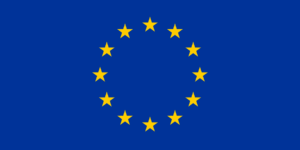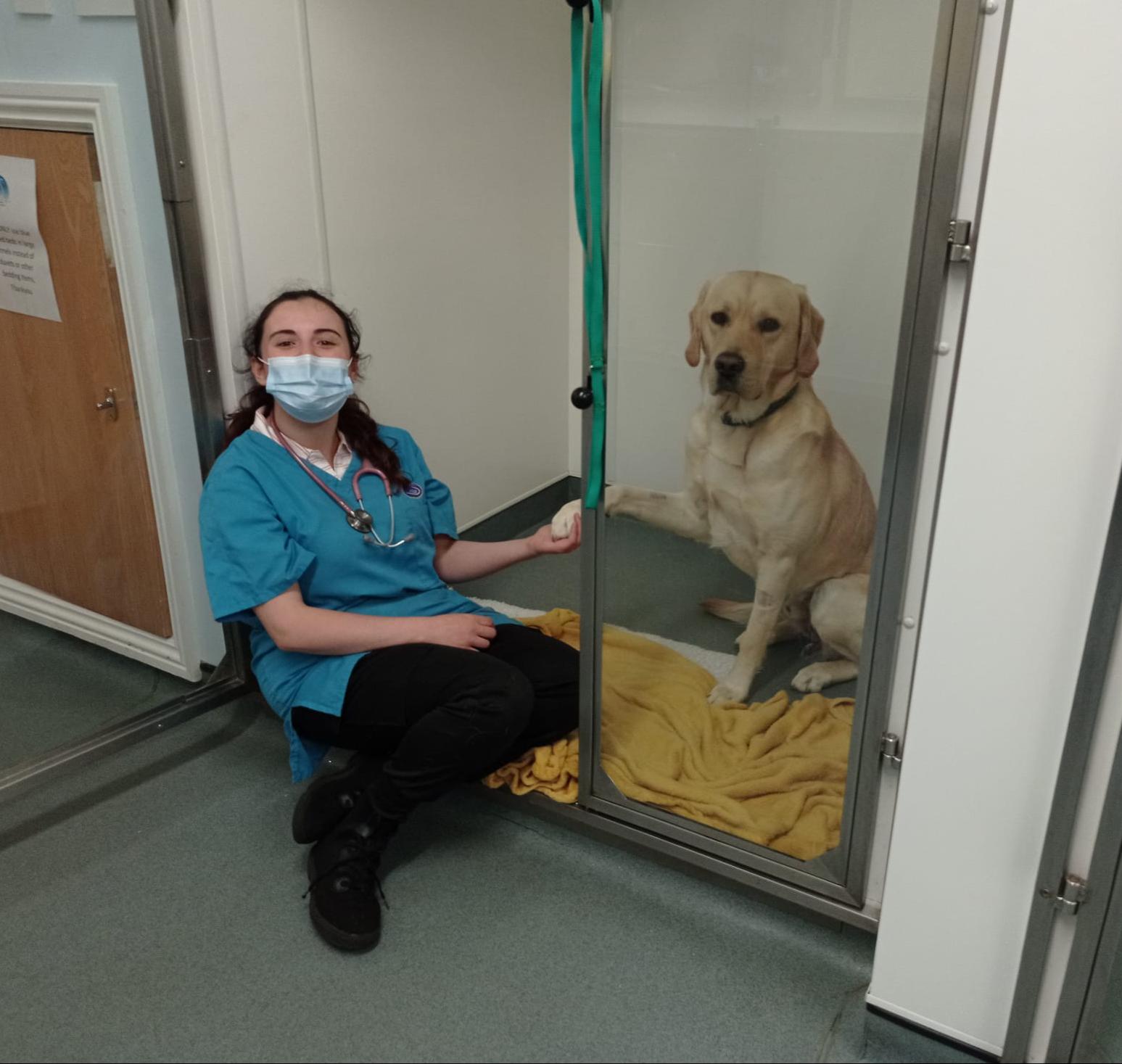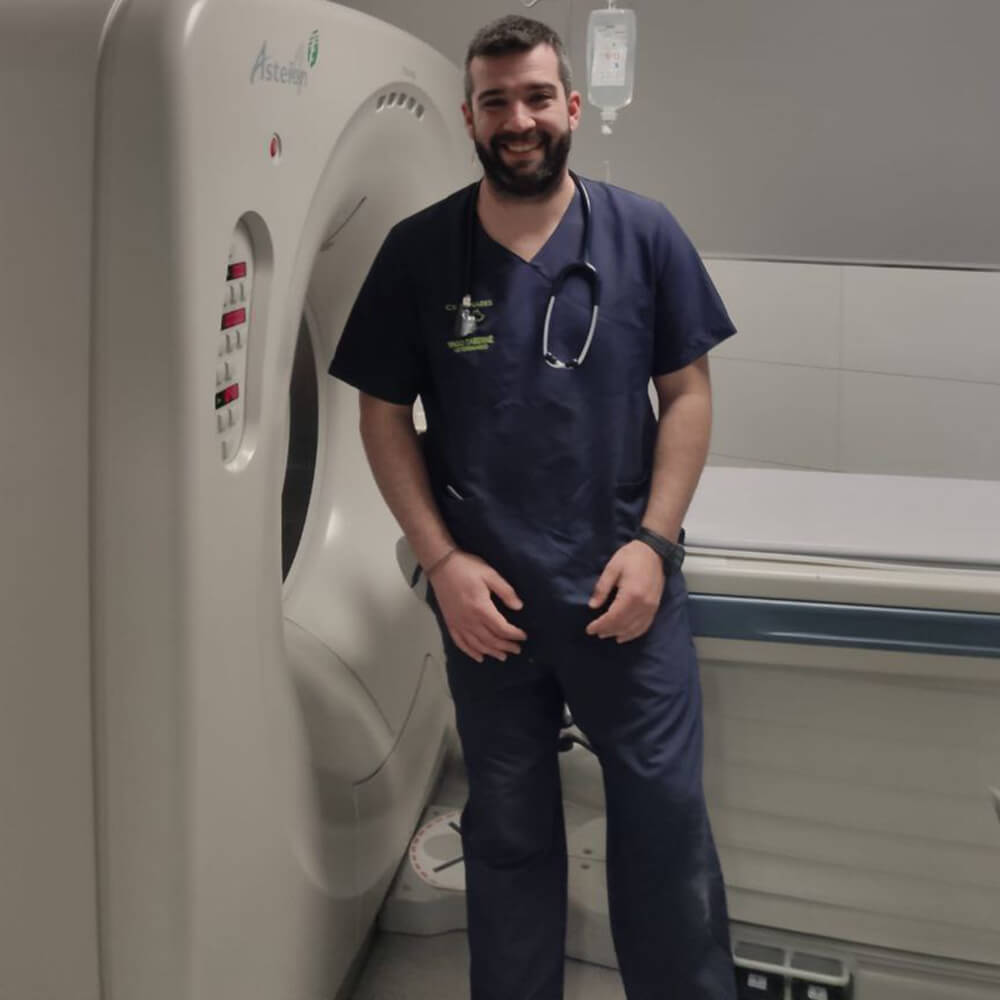Postgraduate in Small Animal Neurology
Obtain your credential - PgCert. Neuro. ifevet
Postgraduate in Small Animal Neurology
Obtain your credential -
PgCert. Neuro. ifevet
Start date
7th February 2026
Timetable
Saturday from 9:00 to 16:30 Sunday from 9:00 to 16:30
ECTS Credits
30 ECTS credits
Number of modules
12 modules
Modality
Streaming
Number of students
36 students
Start date
7th February 2026
Timetable
Saturday, 9 to 16:30 Sunday, 9 to 16:30
ECTS Credits
30 ECTS credits
Modules
12 modules
Modality
Streaming
Number of students
36 students
- Description
- Speakers
- Programme
- Pricing
Certification obtained
After passing the postgraduate university training, you will be able to obtain the following credentials to use in your CV:
• International Credential: PgCert. Neuro. ifevet
• Certification obtained: Postgraduate Certificate in Small Animal Neurology (ifevet)
Course Objective
The aim of this course is to develop strong clinical thinking skills for day-to-day practice. It will provide robust knowledge of neurology, focusing on clear anatomical localisation and differential diagnosis, which will be applied to the most common diseases in dogs and cats.
Structure and benefits of the postgraduate programme
The postgraduate programme comprises modules with theoretical and practical lectures, enabling students to systematically approach neurology cases. Each module will be taught by one or several ECVN diplomats (or residency-trained specialists), pioneers in their fields, to ensure the highest quality training.
At the end of each module, students will gain comprehensive insight into the clinical presentation, diagnosis, treatment possibilities, and prognosis of neurological patients. They will be capable of conducting a complete neurological examination, localising lesions within the nervous system, making a differential diagnosis, and planning appropriate diagnostic and treatment procedures. Moreover, they will have time to relate these lectures to their cases, asking questions and interacting with experienced clinicians.
Target Audience
Designed for professionals working in first opinion, emergencies, or those seeking to specialise in neurology via an internship or residency. This programme is for veterinarians who wish to deepen their knowledge in this speciality, update their skills, and learn innovative aspects applicable to daily practice.
This postgraduate programme will be highly beneficial for clinicians with some experience in neurology, as well as for beginners needing a clear grasp of fundamental concepts from the outset.

ANE URIARTE
DVM, MRCSV, DipECVN, EBVS® European Specialist in Veterinary Neurology and RCVS Specialist in Veterinary Neurology | Director of the Neurology Postgraduate course

ANNA SUÑOL
Lda Vet, Dipl ECVN, SFHEA, MRCVS, EBVS® European Specialist In Veterinary Neurology And RCVS Specialist In Veterinary Neurology

Sebastien Behr
DVM (Hons) DipECVN MRCVS, EBVS® European Specialist in Veterinary Neurology, RCVS Specialist in Veterinary Neurology, Head of Neurology- neurosurgery Willows Referral, Neurology Consultant Vet3D

Holger Volk
DVM, PGCAP, PhD, DipECVN, FHEA, FRCVS, EBVS® European Specialist in Veterinary Neurology and RCVS Specialist in Veterinary Neurology

Alex Forward
BVSc MSc MVetMed DipECVN MCRVS EBVS® European Specialist in Veterinary Neurology and RCVS Specialist in Veterinary Neurology

Sophie Wyatt
BVetMed(Hons) MVetMed DipECVN MRCVS, EBVS® European Specialist in Veterinary Neurology and RCVS Specialist in Veterinary Neurology

Elsa Beltrán
LV, Dipl ECVN, PGCertVetEd FHEA, MRCVS, EBVS® European Specialist in Veterinary Neurology and RCVS Specialist in Veterinary Neurology

Tim Bentley
BVSc (Dist), DACVIM (Neurology), MRCVS, EBVS® European Specialist in Veterinary Neurology and RCVS Specialist in Veterinary Neurology


Bruno Lopes
DVM, GPCert(Neuro), DipECVN, MRCVS, EBVS® European Specialist in Veterinary Neurology and RCVS Specialist in Veterinary Neurology

Nick Grapes
BVetMed(hons) MVetMed PGDipVCP DipECVN MRCVS European Specialist in Veterinary Neurology

Date: 7th February 2026
Modality: Streaming
Competencies and objectives:
- Establish the fundamentals of neuroanatomy in dogs and cats.
- Describe and interpret a comprehensive neurological examination, emphasizing differences between dogs and cats.
- Localise a lesion within the CNS and provide a differential diagnosis based on the VITAMIND framework.
Module Summary:
- The Neurological Examination.
- Localization of Spinal Lesions.
- Localization of Intracranial Lesions.
- Differential Diagnosis Based on VITAMIND.
Speaker: Elsa Beltrán
Date: 8th February 2026
Modality: Streaming
Competencies and objectives:
- Describe and interpret the neurological examination in patients with peripheral nervous system disorders.
- Understand diagnostic methods for patients affected by the peripheral nervous system.
- Differentiate the most common diseases of nerves, muscles, and neuromuscular junctions, including their diagnosis, treatment, and prognosis.
Module Summary:
- Neurological examination of the peripheral nervous system.
- Complementary test for peripheral nervous system diseases.
- Most common nerve diseases.
- Most common neuromuscular junction diseases.
- Most common myopathies.
- Clinical cases study.
Speaker: Ane Uriarte
Date: 7th March 2026
Modality: Streaming
Competencies and objectives:
- Understand epilepsy classification and clinical presentation.
- Identify long-term versus emergency treatment for epileptic seizures.
- Differentiate between epileptic seizures and paroxysmal dyskinesias, including their treatment and prognosis.
Module Summary:
- Epilepsy: Clinical Presentation and Classification.
- Epilepsy Treatment.
- Movement Disorders.
Speaker: Holger Volk
Date: 8th March 2026
Modality: Streaming
Competencies and objectives:
- Understand cerebrospinal fluid function and its diagnostic utility.
- Understand the differences between advanced imaging procedures when studying the spine and the brain, including when to choose CT versus MRI and how to interpret them.
Module Summary:
- Cerebrospinal Fluid: Technique and Interpretation.
- CT Scan vs MRI in the Spine.
- CT Scan vs MRI in the Brain.
- Interactive Clinical Cases.
Speaker: Anna Suñol
Date: 18th April 2026
Modality: Streaming
Competencies and objectives:
- Stabilisation of the neuro-emergency patient.
- Recognising and treating status epilepticus in dogs and cats.
- Treatment approach to the traumatised spine and brain.
Module Summary:
- Introduction to neurological emergencies including assessment and stabilisation.
- Cluster seizures and SE.
- Traumatic brain and spinal injuries.
- Acute encephalopathies, including vestibular disease.
- Clinical cases.
Speaker: Sophie Wyatt
Date: 19th April 2026
Modality: Streaming
Competencies and objectives:
- Recognize the clinical presentation of a stroke and discuss treatment and prognosis.
- Understand the most common inflammatory brain diseases in dogs and cats, including their treatment.
- Recognize and treat metabolic encephalopathies.
Module Summary:
- Vascular encephalopathies: ischemic and haemorrhagic.
- Immune-mediated encephalitis.
- Infectious brain disorders (including ear infections).
- Metabolic and toxic encephalopathies.
Speaker: Bruno Lopes
Date: 16th May 2026
Modality: Streaming
Competencies and objectives:
- Identify the differences in presentation, diagnosis, and treatment of cancer in the brain or spine.
- Clinical case presentation with decision making.
Module Summary:
- Brain tumour classification and clinical presentation.
- Brain tumour diagnosis and symptomatic therapy.
- Brain tumour treatment.
- Spinal/nerve tumour classification and clinical presentation.
- Spinal tumor treatment.
- Clinical cases.
Speaker: Tim Bentley
Date: 17th May 2026
Modality: Streaming
Competencies and objectives:
- Clinical presentation, diagnosis and prognosis of vascular versus inflammatory myelopathies.
- How to treat the challenging discospondylitis.
- The most common spinal cord diseases in cats.
- Clinical case discussion.
Module Summary:
- Vascular myelopathy.
- Inflammatory and infectious diseases of the spine.
- Degenerative myelopathy: clinical presentation and differential diagnosis.
- Interactive clinical cases.
Speaker: Alex Forward
Date: 13th June 2026
Modality: Streaming
Competencies and objectives:
- Presentation of the most common vertebral malformation with their clinical signs, epidemiology and treatment.
- Understand the lumbosacral syndrome and it’s challenging presentation.
Module Summary:
- AA luxation.
- Articular process dysplasia and SAD.
- Lumbosacral: clinical presentation, treatment, and prognosis.
Speaker: Sebastien Behr
Date: 14th June 2026
Modality: Streaming
Competencies and objectives:
- Present the most relevant congenital brain diseases for daily clinical practice.
- Physiopathology and clinical presentation of Hydrocephalus and Chiari-Like malformation.
- Diagnostic approach of storage diseases with a focus on Lafora disease, neuronal ceroid lipofuscinosis, and metabolic diseases like L-2-HGA.
- Understand age-associated cognitive decline.
Module Summary:
- CSF disorders – hydrocephalus and supracollicular fluid collection.
- CSF disorders – Canine Chiari and syringomyelia.
- Neuropathic pain: Management of Canine Chiari and syringomyelia.
- Inherited brain diseases.
- Canine/Feline dementia.
- Congenital brain disorders.
Speaker: Susana Monforte-Monteiro
Date: 11th July 2026
Modality: Streaming
Competencies and objectives:
- Define the different types of disc herniations and their treatment.
- Understand the different types of caudal cervical myelopathies and their treatment and prognosis.
Module Summary:
- Intervertebral disc disease: classification and clinical presentation PF.
- IVDD: Diagnostic techniques, treatment, and prognosis PF.
- Caudal cervical spondylomyelopathy.
Speaker: Paul Freeman
Date: 12th July 2026
Modality: Streaming
Competencies and objectives:
- Identify and integrate various. neurological diseases discussed during the postgraduate program based on clinical cases.
Module Summary:
- Clinical cases neurological examination and localisation.
- Clinical cases brain.
- Clinical cases spine PF.
Farewell and conclusion of the postgraduate program.
Speaker: Nick Grapes
We offer two payment options:
- Pay in full via credit or debit card, or BACS
- Interest-free instalments
For more details on interest-free instalment options, please complete the ‘Request for More Information’ form.
· Price (exam included):
- United Kingdom:
 United Kingdom – £ 7,500
United Kingdom – £ 7,500
- Other countries:
 Europe – 8,900 €
Europe – 8,900 €  Australia – $ 15,800
Australia – $ 15,800 New Zealand – $ 17,100
New Zealand – $ 17,100 USA – $ 9,600
USA – $ 9,600
* Note: The digital certificate is included in the programme fee.
Terms and conditions of payment
To complete your enrolment, kindly submit the online registration form by selecting ‘Register Now’ and proceed with your first payment, either in full or as the initial instalment.
If you have chosen our instalment plan, the monthly payments must be made via direct debit within the first 10 days of each month.
All payments must be completed before the final exam in order for the PgCert certificate and credentials to be issued.
Certification obtained
After passing the postgraduate university training, you will be able to obtain the following credentials to use in your CV:
• International Credential: PgCert. Neuro. ifevet
• Certification obtained: Postgraduate Certificate in Small Animal Neurology (ifevet)
Course Objective
The aim of this course is to develop strong clinical thinking skills for day-to-day practice. It will provide robust knowledge of neurology, focusing on clear anatomical localisation and differential diagnosis, which will be applied to the most common diseases in dogs and cats.
Structure and benefits of the postgraduate programme
The postgraduate programme comprises modules with theoretical and practical lectures, enabling students to systematically approach neurology cases. Each module will be taught by one or several ECVN diplomats (or residency-trained specialists), pioneers in their fields, to ensure the highest quality training.
At the end of each module, students will gain comprehensive insight into the clinical presentation, diagnosis, treatment possibilities, and prognosis of neurological patients. They will be capable of conducting a complete neurological examination, localising lesions within the nervous system, making a differential diagnosis, and planning appropriate diagnostic and treatment procedures. Moreover, they will have time to relate these lectures to their cases, asking questions and interacting with experienced clinicians.
Target Audience
Designed for professionals working in first opinion, emergencies, or those seeking to specialise in neurology via an internship or residency. This programme is for veterinarians who wish to deepen their knowledge in this speciality, update their skills, and learn innovative aspects applicable to daily practice.
This postgraduate programme will be highly beneficial for clinicians with some experience in neurology, as well as for beginners needing a clear grasp of fundamental concepts from the outset.

ANE URIARTE
DVM, MRCSV, DipECVN, EBVS® European Specialist in Veterinary Neurology and RCVS Specialist in Veterinary Neurology | Director of the Neurology Postgraduate course

ANNA SUÑOL
Lda Vet, Dipl ECVN, SFHEA, MRCVS, EBVS® European Specialist In Veterinary Neurology And RCVS Specialist In Veterinary Neurology

Sebastien Behr
DVM (Hons) DipECVN MRCVS, EBVS® European Specialist in Veterinary Neurology, RCVS Specialist in Veterinary Neurology, Head of Neurology- neurosurgery Willows Referral, Neurology Consultant Vet3D

Holger Volk
DVM, PGCAP, PhD, DipECVN, FHEA, FRCVS, EBVS® European Specialist in Veterinary Neurology and RCVS Specialist in Veterinary Neurology

Alex Forward
BVSc MSc MVetMed DipECVN MCRVS EBVS® European Specialist in Veterinary Neurology and RCVS Specialist in Veterinary Neurology

Sophie Wyatt
BVetMed(Hons) MVetMed DipECVN MRCVS, EBVS® European Specialist in Veterinary Neurology and RCVS Specialist in Veterinary Neurology

Elsa Beltrán
LV, Dipl ECVN, PGCertVetEd FHEA, MRCVS, EBVS® European Specialist in Veterinary Neurology and RCVS Specialist in Veterinary Neurology

Tim Bentley
BVSc (Dist), DACVIM (Neurology), MRCVS, EBVS® European Specialist in Veterinary Neurology and RCVS Specialist in Veterinary Neurology


Bruno Lopes
DVM, GPCert(Neuro), DipECVN, MRCVS, EBVS® European Specialist in Veterinary Neurology and RCVS Specialist in Veterinary Neurology

Nick Grapes
BVetMed(hons) MVetMed PGDipVCP DipECVN MRCVS European Specialist in Veterinary Neurology

Date: 7th February 2026
Modality: Streaming
Competencies and objectives:
- Establish the fundamentals of neuroanatomy in dogs and cats.
- Describe and interpret a comprehensive neurological examination, emphasizing differences between dogs and cats.
- Localise a lesion within the CNS and provide a differential diagnosis based on the VITAMIND framework.
Module Summary:
- The Neurological Examination.
- Localization of Spinal Lesions.
- Localization of Intracranial Lesions.
- Differential Diagnosis Based on VITAMIND.
Speaker: Elsa Beltrán
Date: 8th February 2026
Modality: Streaming
Competencies and objectives:
- Describe and interpret the neurological examination in patients with peripheral nervous system disorders.
- Understand diagnostic methods for patients affected by the peripheral nervous system.
- Differentiate the most common diseases of nerves, muscles, and neuromuscular junctions, including their diagnosis, treatment, and prognosis.
Module Summary:
- Neurological examination of the peripheral nervous system.
- Complementary test for peripheral nervous system diseases.
- Most common nerve diseases.
- Most common neuromuscular junction diseases.
- Most common myopathies.
- Clinical cases study.
Speaker: Ane Uriarte
Date: 7th March 2026
Modality: Streaming
Competencies and objectives:
- Understand epilepsy classification and clinical presentation.
- Identify long-term versus emergency treatment for epileptic seizures.
- Differentiate between epileptic seizures and paroxysmal dyskinesias, including their treatment and prognosis.
Module Summary:
- Epilepsy: Clinical Presentation and Classification.
- Epilepsy Treatment.
- Movement Disorders.
Speaker: Holger Volk
Date: 8th March 2026
Modality: Streaming
Competencies and objectives:
- Understand cerebrospinal fluid function and its diagnostic utility.
- Understand the differences between advanced imaging procedures when studying the spine and the brain, including when to choose CT versus MRI and how to interpret them.
Module Summary:
- Cerebrospinal Fluid: Technique and Interpretation.
- CT Scan vs MRI in the Spine.
- CT Scan vs MRI in the Brain.
- Interactive Clinical Cases.
Speaker: Anna Suñol
Date: 18th April 2026
Modality: Streaming
Competencies and objectives:
- Stabilisation of the neuro-emergency patient.
- Recognising and treating status epilepticus in dogs and cats.
- Treatment approach to the traumatised spine and brain.
Module Summary:
- Introduction to neurological emergencies including assessment and stabilisation.
- Cluster seizures and SE.
- Traumatic brain and spinal injuries.
- Acute encephalopathies, including vestibular disease.
- Clinical cases.
Speaker: Sophie Wyatt
Date: 19th April 2026
Modality: Streaming
Competencies and objectives:
- Recognize the clinical presentation of a stroke and discuss treatment and prognosis.
- Understand the most common inflammatory brain diseases in dogs and cats, including their treatment.
- Recognize and treat metabolic encephalopathies.
Module Summary:
- Vascular encephalopathies: ischemic and haemorrhagic.
- Immune-mediated encephalitis.
- Infectious brain disorders (including ear infections).
- Metabolic and toxic encephalopathies.
Speaker: Bruno Lopes
Date: 16th May 2026
Modality: Streaming
Competencies and objectives:
- Identify the differences in presentation, diagnosis, and treatment of cancer in the brain or spine.
- Clinical case presentation with decision making.
Module Summary:
- Brain tumour classification and clinical presentation.
- Brain tumour diagnosis and symptomatic therapy.
- Brain tumour treatment.
- Spinal/nerve tumour classification and clinical presentation.
- Spinal tumor treatment.
- Clinical cases.
Speaker: Tim Bentley
Date: 17th May 2026
Modality: Streaming
Competencies and objectives:
- Clinical presentation, diagnosis and prognosis of vascular versus inflammatory myelopathies.
- How to treat the challenging discospondylitis.
- The most common spinal cord diseases in cats.
- Clinical case discussion.
Module Summary:
- Vascular myelopathy.
- Inflammatory and infectious diseases of the spine.
- Degenerative myelopathy: clinical presentation and differential diagnosis.
- Interactive clinical cases.
Speaker: Alex Forward
Date: 13th June 2026
Modality: Streaming
Competencies and objectives:
- Presentation of the most common vertebral malformation with their clinical signs, epidemiology and treatment.
- Understand the lumbosacral syndrome and it’s challenging presentation.
Module Summary:
- AA luxation.
- Articular process dysplasia and SAD.
- Lumbosacral: clinical presentation, treatment, and prognosis.
Speaker: Sebastien Behr
Date: 14th June 2026
Modality: Streaming
Competencies and objectives:
- Present the most relevant congenital brain diseases for daily clinical practice.
- Physiopathology and clinical presentation of Hydrocephalus and Chiari-Like malformation.
- Diagnostic approach of storage diseases with a focus on Lafora disease, neuronal ceroid lipofuscinosis, and metabolic diseases like L-2-HGA.
- Understand age-associated cognitive decline.
Module Summary:
- CSF disorders – hydrocephalus and supracollicular fluid collection.
- CSF disorders – Canine Chiari and syringomyelia.
- Neuropathic pain: Management of Canine Chiari and syringomyelia.
- Inherited brain diseases.
- Canine/Feline dementia.
- Congenital brain disorders.
Speaker: Susana Monforte-Monteiro
Date: 11th July 2026
Modality: Streaming
Competencies and objectives:
- Define the different types of disc herniations and their treatment.
- Understand the different types of caudal cervical myelopathies and their treatment and prognosis.
Module Summary:
- Intervertebral disc disease: classification and clinical presentation PF.
- IVDD: Diagnostic techniques, treatment, and prognosis PF.
- Caudal cervical spondylomyelopathy.
Speaker: Paul Freeman
Date: 12th July 2026
Modality: Streaming
Competencies and objectives:
- Identify and integrate various. neurological diseases discussed during the postgraduate program based on clinical cases.
Module Summary:
- Clinical cases neurological examination and localisation.
- Clinical cases brain.
- Clinical cases spine PF.
Farewell and conclusion of the postgraduate program.
Speaker: Nick Grapes
We offer two payment options:
- Pay in full via credit or debit card, or BACS
- Interest-free instalments
For more details on interest-free instalment options, please complete the ‘Request for More Information’ form.
· Price (exam included):
- United Kingdom:
 United Kingdom – £ 7,500
United Kingdom – £ 7,500
- Other countries:
 Europe – 8,900 €
Europe – 8,900 €  Australia – $ 15,800
Australia – $ 15,800 New Zealand – $ 17,100
New Zealand – $ 17,100 USA – $ 9,600
USA – $ 9,600
* Note: The digital certificate is included in the programme fee.
Terms and conditions of payment
To complete your enrolment, kindly submit the online registration form by selecting ‘Register Now’ and proceed with your first payment, either in full or as the initial instalment.
If you have chosen our instalment plan, the monthly payments must be made via direct debit within the first 10 days of each month.
All payments must be completed before the final exam in order for the PgCert certificate and credentials to be issued.
Testimonials from our students




Testimonials from our students




Contact us
If you would like to request information about any of our training services, please fill in the following form or contact us by phone or email
- +44 7862 146532
- [email protected]
- From 8.00am to 17.00pm
Request for information
Contact us
If you would like to request information about any of our training services, please fill in the following form or contact us by phone or email
- +44 7862 146532
- [email protected]
- From 8.00am to 17.00pm


